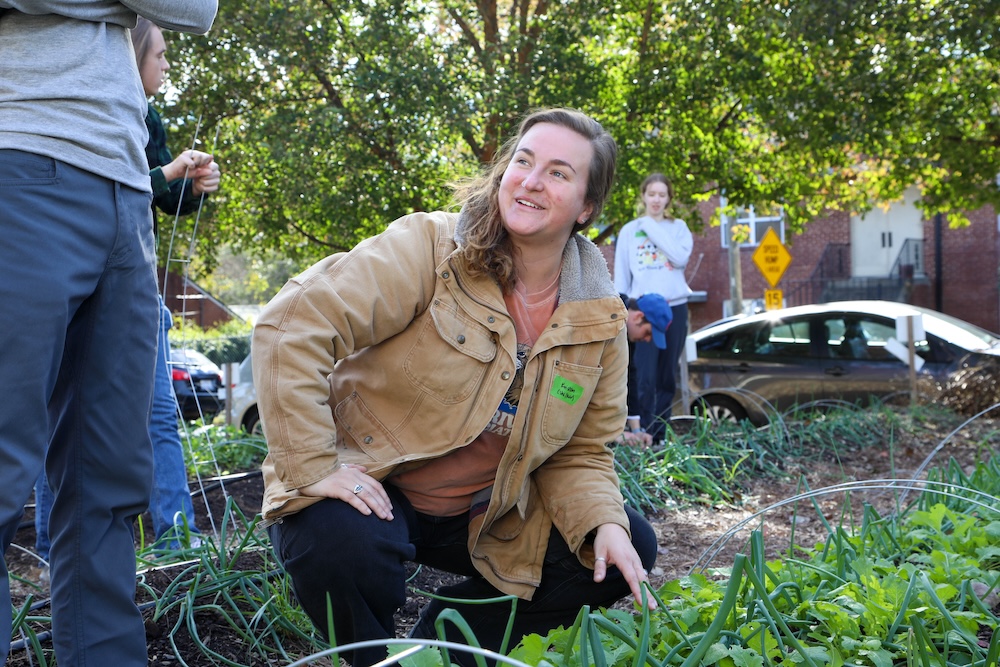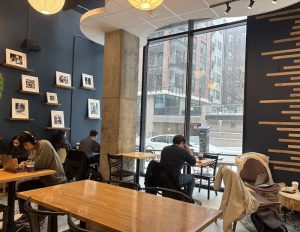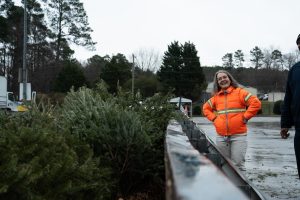On a Sunday morning this fall, Kristen Sommerfeld rang a small metal bell.
Clad in overalls and a sleeve of botanic tattoos, she stood among rows of planted vegetables on a farm in urban Durham. Twenty others worked around her, picking peppers, planting onions and pruning okra. The chime signaled a moment to regroup.
The small plot on the corner of Watts and Green streets looks like an ambitious neighbor’s personal vegetable garden — full of root and leafy vegetables, seeded fruits and beans. But the lot, nestled in the heart of the city’s Trinity Park neighborhood, is home to something larger.
It’s Farm Church, a nontraditional place of worship without walls or a roof. Its members meet outside and pray with their hands in the soil. Founded in 2016 as a Presbyterian ministry, the church harvests thousands of pounds of vegetables each year to address food insecurity in Durham.
“We like to say that we’re a farm with a church on the side,” said Sommerfeld, the farm’s ‘garden and gathered worship lead’ and only paid employee. “The farm is central, and the church sort of wraps itself around.”
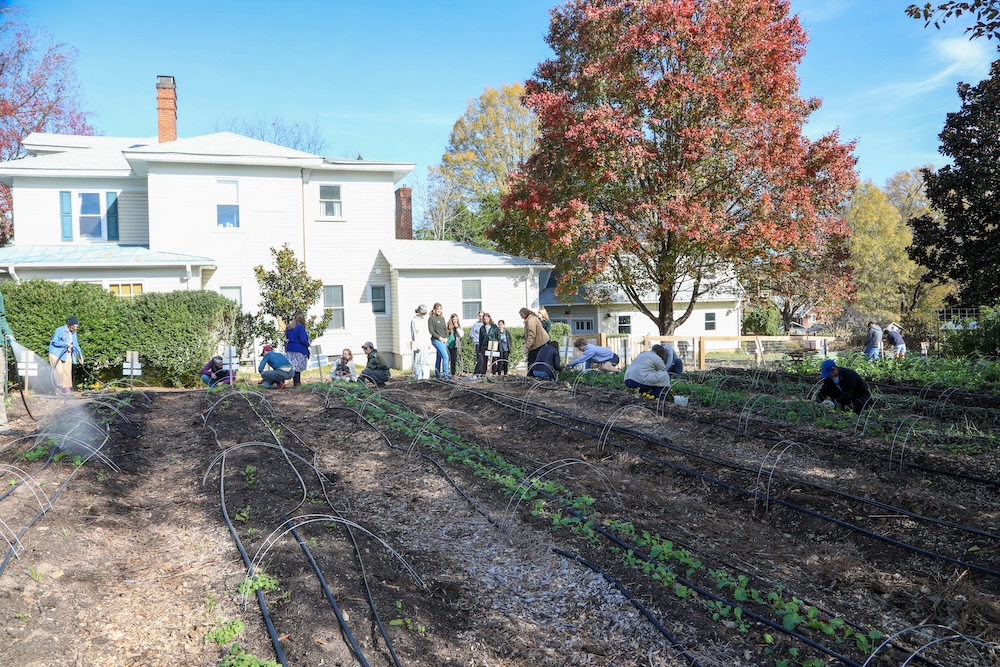
Members — mostly progressive young adults in their twenties and thirties — gathered under a magnolia tree. Some grew up attending traditional church but rejected its customs. Others are atheist or agnostic.
They perched on a low wooden bench or settled cross-legged on the ground, fidgeting with woodchips and picking dirt from under their fingernails as Sommerfeld spoke.
Worship began with a collective breath — to “ground ourselves in the space,” Sommerfeld explained. With eyes closed, congregants inhaled crisp, earthy air for 1… 2… 3… 4. Held for 1… 2… 3… 4. Exhaled for 1… 2… 3… 4. Held for 1… 2… 3… 4.
Then Sommerfeld read a passage from the Book of Numbers and the whole of the children’s book What Do You Do with an Idea?, the story of a child learning to embrace, nurture and celebrate a new idea. “How did that story feel?” Sommerfeld asked after each reading. The group discussed matriarchy and climate change. They sang a song from Moana. They shared Communion.
“The book about ideas reminds me so much of the founders of Farm Church,” said one gentle congregant, smiling. “They had an idea, and years later here we all are, gathered under the magnolia tree.”
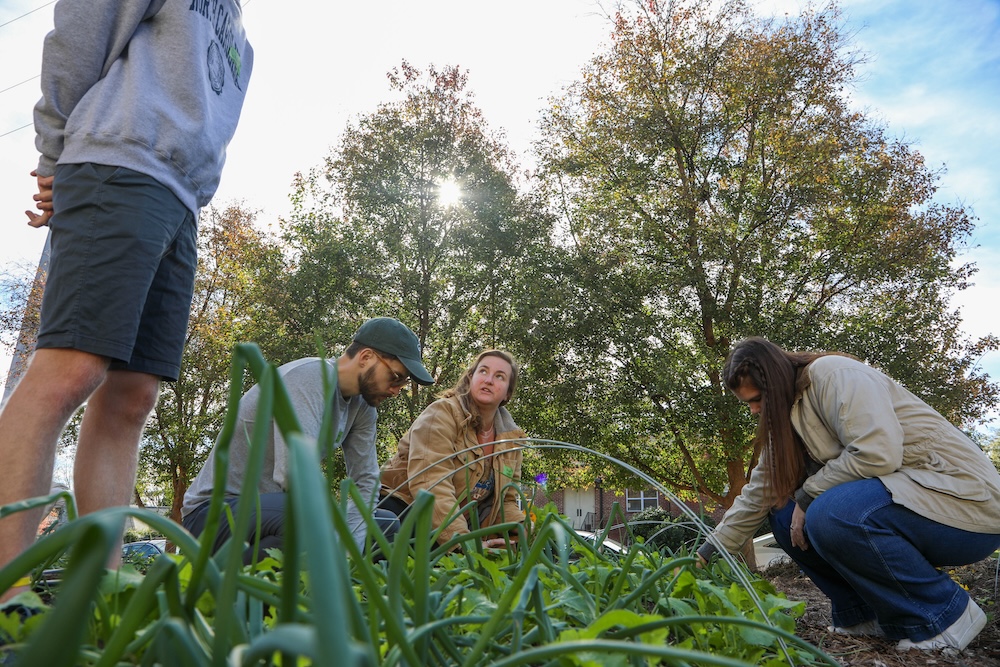
Fifteen neat rows line the Farm Church lot, like pews in a steepled chapel. Tall flowers marked the west end of the property, near the sidewalk on Watts Street — those are gone now, in time for winter. Parallel ran rows of carrots and fava beans, identifiable only by their hand-painted wooden labels. Okra towered above, with winding, whimsical stalks that looked like they belonged in a Dr. Seuss book.
There were green onions, too, with chutes flopping over each other, shaded by tomato vines long past their summer prime. Red and green jalapeño peppers, some plump and others underripe, grew on vines tangled in a tall fence. A pride flag hangs from the fence, billowing with each gust of wind.
A bite in the air signaled the first truly cold day of fall. The leaves on Green Street were just beginning to turn as the preparations for winter began.
Reliant on warmth and sun, the church bends to the natural rhythms of the seasons. In the summer months, when the light is long and the harvest abundant, some members spend entire Sundays kneeling in the dirt. There’s less to do in the winter, when some of the plot’s rows are covered. Morning meetings shift later to avoid the cold. Timing, like faith, is fluid.
After the service, Sommerfeld explained that the theology of Farm Church is anti-capitalist.
“Jesus is on the side of those who are intentionally oppressed, those who are being exploited for profit and those who are bold enough to ask for what they need,” she said as she bounced a congregant’s baby on her hip. She said land, just like people, is held captive by capitalism. “Is it possible to own the land,” she questioned, “or does the land always own us?”
The farm isn’t just a space to contemplate big ideas. It has a tangible mission: to feed hungry Durhamites.
Almost 14% of Durham County residents — just under 43,000 people — were food insecure in 2021, meaning they lacked reliable access to sufficient affordable, nutritious food. Low-income and marginalized communities are at greater risk of food insecurity across the U.S., and Durham is no exception. Before the COVID-19 pandemic, about 1 in 4 Latino and 1 in 6 Black residents reported skipping meals.
Farm Church members have harvested and donated more than 3,600 pounds of produce this year. Most of it has gone to Iglesia Emanuel, a local Presbyterian church and food pantry. Smaller organizations like the Lincoln Community Health Center, Reality Ministries and Durham’s free community fridges accept the food, too.
Sommerfeld said the farm can’t solve the problem of food insecurity, or come anywhere close. Her focus is on making a hyper-local impact and living the values she reads in the Bible.
“Jesus wanted us to make sure everyone had what they needed,” she said on a Thursday morning at the farm, raking leaves as she spoke. “Sometimes that means doing what seems like a silly, small thing.”
Above: Kristen Sommerfield talks with a member at Farm Church. Photo by Abigail Bromberger — The 9th Street Journal
Nina Moske

